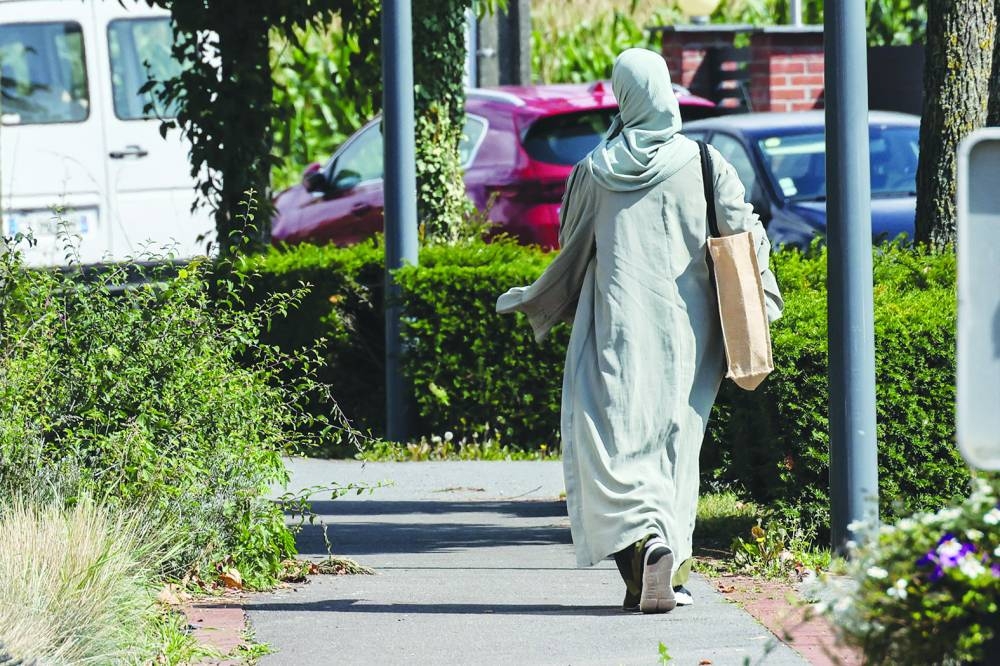French schools sent dozens of girls home for refusing to remove their abayas — an over-garment from the shoulders to the feet worn by Muslim women — on the first day of the school year, a government minister said on Tuesday.
Defying a ban on the Muslim robe, nearly 300 girls showed up Monday morning wearing an abaya, Gabriel Attal told the BFM broadcaster.
Most agreed to change out of the robe, but 67 refused and were sent home, he said.
The government announced last month it was banning the abaya in schools, saying it broke the rules on secularism in education that have already seen Muslim headscarves banned on the grounds they constitute a display of religious affiliation.
The move gladdened the political right but the hard-left argued it represented an affront to civil liberties.
Attal said the girls refused entry were given a letter addressed to their families saying that “secularism is not a constraint, it is a liberty”.
If they showed up at school again wearing the abaya there would be a “new dialogue”, the minister said.
Late Monday, President Emmanuel Macron defended the controversial measure, saying there was a “minority” in France who “hijack a religion and challenge the republic and secularism”, leading to the “worst consequences”.
An association representing Muslims has filed a motion with the State Council, France’s highest court for complaints against state authorities, for an injunction against the ban on the abaya and the qamis, its equivalent dress for men.
The Action for the Rights of Muslims (ADM) motion was being examined on Tuesday.
France’s Council of the Muslim Faith (CFCM), established to represent Muslims before the government, warned that the banning of the abaya could create “an elevated risk of discrimination” and said it was considering putting its own complaint before the State Council.
The absence of “a clear definition of this garment creates a vague situation and legal uncertainty,” it said.
It expressed fear over “arbitrary” controls and that the criteria for evaluating young girls’ dress could be based on “the supposed origin, last name or skin colour” rather than what they wore.
A law introduced in March 2004 banned “the wearing of signs or outfits by which students ostensibly show a religious affiliation” in schools.
This includes large Christian crosses, Jewish kippas and Muslim headscarves.
Unlike headscarves, abayas occupied a grey area and had faced no outright ban until now.
Attal said he was in favour of trialling school uniforms or a dress code amid a debate over a ban in state-run schools on abaya.
Uniforms have not been obligatory in French schools since 1968 but have regularly come back on the political agenda, often pushed by conservative and far-right politicians. Attal, who announced the abaya ban earlier this week, told BFM TV he would provide a timetable in autumn for carrying out a trial run of uniforms with any schools that agree to participate.
“I don’t think that the school uniform is a miracle solution that solves all problems related to harassment, social inequalities or secularism,” he said. But he added: “We must go through experiments, try things out” in order to promote debate, he said.
France has enforced a ban on religious symbols in state schools since 2004 to uphold its strict brand of secularism known as “laicite”. The topic is a sensitive one, regularly triggering political tension in the country.
For some, wearing a uniform means equality and erasing differences of social status and wealth. For others it is a debate that is not needed and is distracting from more serious issues such as discipline and harassment.
In January 2023 President Emmanuel Macron’s wife Brigitte told *Le Parisien newspaper in an interview that a school uniform “erases differences, we save time — it’s time-consuming to choose how to dress in the morning — and money — compared to brands.”
She recalled wearing a uniform for 15 years, a navy blue skirt and sweater as a student, telling the paper she took it well.
“So I am in favour of wearing a school uniform, but with a simple and not dull outfit.”
The issue has been a dominant theme of French politics after the summer holidays, with the hard-left has accusing the government of trying with the abaya ban to compete with Marine Le Pen’s far-right National Rally and shifting further to the right.
The announcement late last month of the ban was the first major move by Attal, 34, since he was promoted this summer to handle the hugely contentious education portfolio.
Along with Interior Minister Gerald Darmanin, 40, he is seen as a rising star who could potentially play an important role after Macron steps down in 2027.

A woman wearing an abaya dress walks through the streets of Lille, northern France. The French government’s decision to ban schoolgirls wearing abayas has opened a fresh debate about the country’s secular laws and the treatment of Muslim minorities. (AFP)
